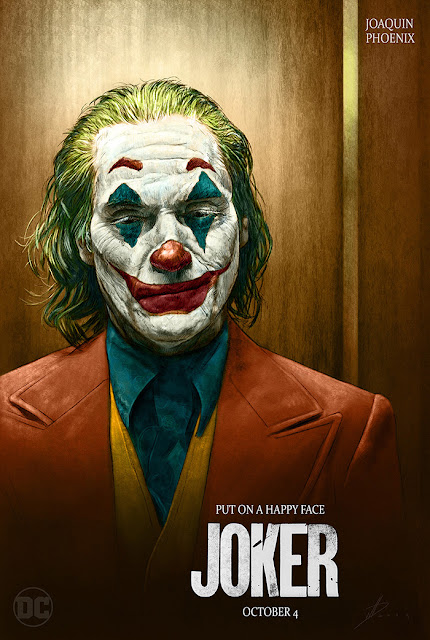Joker's Clown - Asides (VI)
I have little that is interesting or novel to say about Todd Phillips' dark and entertaining superhero origin-myth film Joker. It is a gorgeous piece of Grand Guignol that is muscular enough to stand alone, outside of the DC Comics universe. The set-piece that features Arthur Fleck's eventual transformation into the Joker is incredible. Dancing down a Bronx stairway to the tune of Gary Glitter's 'Rock and Roll Part 2' - Phillips' choice of the paedophile singer is surely deliberate and provocative - the scene can only be described as a kind of mad-ballet (although, I would argue that all ballets are about madness). This has already been noted though, and it's another aspect of Joker that set me pondering along broader lines.
 |
| A coarse clown |
Prior to Fleck's transformation, he holds down a job as a rented clown advertising a shop's closing down sale. Indeed, for a couple of decades now, it seems that all fictional clowns are psychotic misanthropists, ready to pursue evil at the drop of a Pierrot hat: Pennywise, Krusty, and the children's party clown in Uncle Buck, to name just three. Suddenly the cliche seemed shop-worn. And so it was that Joker's opening scene summoned up the distant memory of a much loved poem, E. E. Cummings' 'One Winter Day'. Its defence of outsiders, and, pertinently, a clown, is a gentle nudge towards kindness and the embracing of eccentricity. That Cummings' clown manifests on New York's Eighth Street, drew an immediate parallel with Arthur Fleck's mobile-billboard clown plying his trade in Gotham City's version of Times Square. Here is the poem in full:
one winter afternoon
(at the magical hour
when is becomes if)
when is becomes if)
a bespangled clown
standing on eighth street
handed me a flower.
standing on eighth street
handed me a flower.
Nobody,it’s safe
to say,observed him but
to say,observed him but
myself;and why?because
without any doubt he was
whatever(first and last)
whatever(first and last)
mostpeople fear most:
a mystery for which i’ve
no word except alive
a mystery for which i’ve
no word except alive
—that is,completely alert
and miraculously whole;
and miraculously whole;
with not merely a mind and a heart
but unquestionably a soul-
by no means funereally hilarious
by no means funereally hilarious
(or otherwise democratic)
but essentially poetic
or ethereally serious:
but essentially poetic
or ethereally serious:
a fine not a coarse clown
(no mob,but a person)
(no mob,but a person)
and while never saying a word
who was anything but dumb;
since the silence of him
since the silence of him
self sang like a bird.
Most people have been heard
screaming for international
Most people have been heard
screaming for international
measures that render hell rational
—i thank heaven somebody’s crazy
—i thank heaven somebody’s crazy
enough to give me a daisy
Cummings' bespangled clown is the real deal: poetic, serious, a mystery, and crucially, with a heart and soul. I love the compression of words in this poem - language attempting to shape itself into something more precise, such as 'mostpeople'. And then the glorious combination at the heart of 'funereally hilarious' that unashamedly revels in the idea of the sad clown - both funereal and also really hilarious - only to discard it as cliche. Cummings is interested in a unique eccentric.
Written in the 1950s the poem seems to be, even then, grappling with a cynicism about clowns. What Cummings is demanding - or rather, suggesting - is that we approach clowns and outsiders with more innocence. Seeing a poster for Joker on the side of the bus, I turned to my six year old boy and asked him if he found clowns scary. I received, first a quizzical look, and then the brief definition that 'They're just funny!' Like Cummings, I thank heaven that childhood - the 'magical hour' - resists, for a short time anyway, the cynicism of modern life.
 |
| Paul in a Clown Suit - Pablo Picasso (1924) |
Written in the 1950s the poem seems to be, even then, grappling with a cynicism about clowns. What Cummings is demanding - or rather, suggesting - is that we approach clowns and outsiders with more innocence. Seeing a poster for Joker on the side of the bus, I turned to my six year old boy and asked him if he found clowns scary. I received, first a quizzical look, and then the brief definition that 'They're just funny!' Like Cummings, I thank heaven that childhood - the 'magical hour' - resists, for a short time anyway, the cynicism of modern life.


Comments
Post a Comment